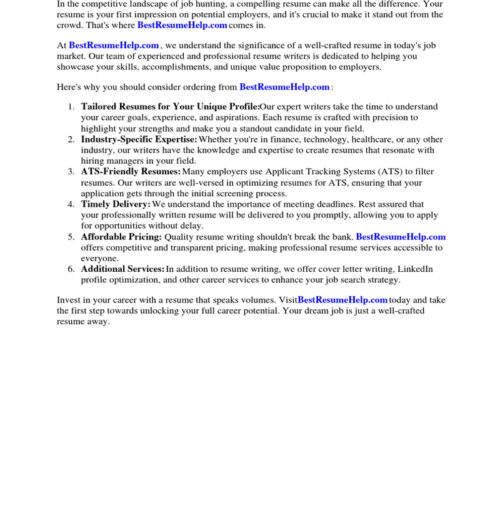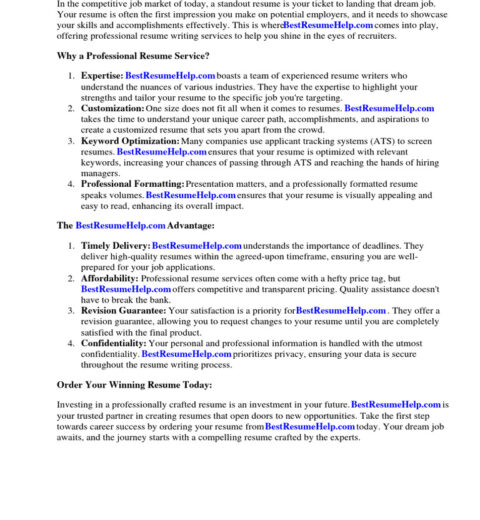In today’s competitive job market, crafting an effective resume is paramount. The trend of having two-page resumes has sparked considerable debate among job seekers and hiring managers alike. While traditional advice often advocates for a concise, one-page resume, there are specific scenarios when a two-page resume not only becomes acceptable but preferred. This article aims to illuminate the circumstances under which extending your resume to two pages can work in your favor and how to execute it effectively.
Understanding the Norms of Resume Length
Typically, a resume should be a brief summary of your skills, experiences, and qualifications. For entry-level positions or individuals with a limited work history, a single page is often sufficient. Recruiters and employers usually spend mere seconds skimming through applications. Hence, succinctness tends to be valued. However, as one’s career progresses and a wealth of experience accumulates, it might be beneficial to extend beyond the confines of one page.
This transition often raises the question: When is it acceptable to have a two-page resume? In essence, having a longer resume can become appropriate in certain contexts. Here are some of those scenarios:
1. Extensive Work Experience
If you are a seasoned professional with multiple years of experience, a two-page resume may be the most effective format to adequately convey your expertise. As you accumulate various roles, responsibilities, and achievements, a single page limits your ability to present yourself holistically. For instance, executives or managers with intricate career paths—spanning numerous positions and comprising leadership roles—often require additional space to paint a complete picture. Your experience should reflect not just the names of employers and positions held but also your contributions and the impact you have made, all of which may warrant more than one page.
2. Specialized Fields
In specialized industries—such as academia, science, technology, or research—a lengthy resume is often standard. Professionals in these fields tend to have numerous publications, projects, and presentations, all of which can contribute to demonstrating their expertise. For example, an academic may need to outline their teaching experience, research projects, publications, and grants received. In such cases, the additional page serves the dual purpose of showcasing depth and allowing for the inclusion of significant accomplishments that might otherwise be omitted.
3. Career Transitions
Individuals transitioning between industries may need to provide more context to clarify their qualifications. A two-page resume allows you to draw connections between your previous industry experience and the new role you are targeting. Highlight relevant skills and transferable accomplishments that may not be immediately apparent to hiring managers unfamiliar with your previous field. This additional space empowers you to construct a narrative that illustrates your adaptability and readiness for the new challenges ahead.
4. Advanced Education
For candidates holding advanced degrees, such as a Master’s or Ph.D., a two-page resume can be justified. Your educational background is crucial and can feature prominently on your resume. Include relevant coursework, thesis projects, key notable experiences during your studies, and academic honors. When applying for certain positions, especially in academia or research, hiring committees may want to see the depth of your intellectual endeavors and scholarly pursuits.
5. Complex Projects or Leadership Roles
Those who have spearheaded significant projects, managed teams, or played critical roles in large-scale initiatives can benefit from a two-page resume. The ability to delineate your various responsibilities and the outcomes of your efforts lends credibility to your candidacy. Consider synthesizing a detailed account of key projects, programs, or transformations you have led, demonstrating not just the scope of your work but also its tangible impact.
Formatting Considerations
If you opt for a two-page format, it’s essential to maintain clarity and professionalism throughout the document. Use a clean layout with ample white space to enhance readability. Here are a few formatting tips:
- Consistent Font and Size: Utilize a uniform font throughout the resume, ensuring the text is easily readable (typically size 10-12 points).
- Headings and Subheadings: Use clear, bold headings to delineate various sections. This helps recruiters easily navigate through your experiences.
- Bullet Points: Present your accomplishments in bullet form for clarity. Each bullet should focus on one specific achievement or responsibility.
- Margins: Keep margins between 0.5 to 1 inch to optimize space while maintaining an uncluttered look.
Conclusion
A two-page resume can indeed be a powerful tool when executed thoughtfully. The key to deciding whether to extend your resume lies in the content itself. If your qualifications, experiences, and achievements necessitate additional space to be presented comprehensively, then including a second page is not just permissible—it’s advisable. Conversely, if your experiences can be succinctly summarized in one page without sacrificing important information, it’s prudent to adhere to that standard. The ultimate goal is to create a compelling document that captures who you are as a professional and convincingly positions you for your desired role.




